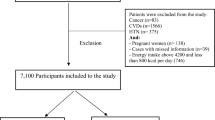Abstract
Purpose
To evaluate the association between the plant-based content of diet and serum testosterone levels in men from the national health and nutrition examination survey (NHANES) database.
Materials and methods
Data on demographics, diet, and testosterone levels was acquired from the NHANES database. Using the food frequency questionnaire, an overall plant-based diet index (PDI) and a healthful plant-based diet index (hPDI) was developed. A higher score on PDI and hPDI indicates higher consumption of plant foods.
Results
A total of 191 participants were included, average age was 45 (30–60) years and average total testosterone level was 546.7 ± 254.7 ng/dL. The mean PDI and hPDI were 50.4 ± 6 and 50.8 ± 7.2, respectively. On multiple linear regression analysis, BMI and age significantly contribute to testosterone levels (p < 0.05); however, neither of the diet indexes significantly predicted serum testosterone levels (PDI: p = 0.446; and hPDI: p = 0.056).
Conclusions
In a well characterized national database, the plant-based diet index is unable to predict testosterone levels. Plant-based food content in diet is not associated with serum testosterone levels.
Similar content being viewed by others
References
Top Trends in Prepared Foods (2017) Exploring trends in meat, fish and seafood; pasta, noodles and rice; prepared meals; savory deli food; soup; and meat substitutes. ReportBuyer
Yokoyama Y, Nishimura K, Barnard ND, Takegami M, Watanabe M, Sekikawa A, Okamura T, Miyamoto Y (2014) Vegetarian diets and blood pressure: a meta-analysis. JAMA Intern Med 174(4):577–587. https://doi.org/10.1001/jamainternmed.2013.14547
Dinu M, Abbate R, Gensini GF, Casini A, Sofi F (2017) Vegetarian, vegan diets and multiple health outcomes: a systematic review with meta-analysis of observational studies. Crit Rev Food Sci Nutr 57(17):3640–3649. https://doi.org/10.1080/10408398.2016.1138447
Kim H, Caulfield LE, Rebholz CM (2018) Healthy plant-based diets are associated with lower risk of all-cause mortality in US adults. J Nutr 148(4):624–631. https://doi.org/10.1093/jn/nxy019
Aleksandrowicz L, Green R, Joy EJ, Smith P, Haines A (2016) The impacts of dietary change on greenhouse gas emissions, land use, water use, and health: a systematic review. PLoS ONE 11(11):e0165797. https://doi.org/10.1371/journal.pone.0165797
Howie BJ, Shultz TD (1985) Dietary and hormonal interrelationships among vegetarian seventh-day adventists and nonvegetarian men. Am J Clin Nutr 42(1):127–134. https://doi.org/10.1093/ajcn/42.1.127
Allen NE, Appleby PN, Davey GK, Key TJ (2000) Hormones and diet: low insulin-like growth factor-I but normal bioavailable androgens in vegan men. Br J Cancer 83(1):95–97. https://doi.org/10.1054/bjoc.2000.1152
Key TJ, Roe L, Thorogood M, Moore JW, Clark GM, Wang DY (1990) Testosterone, sex hormone-binding globulin, calculated free testosterone, and oestradiol in male vegans and omnivores. Br J Nutr 64(1):111–119. https://doi.org/10.1079/bjn19900014
Raben A, Kiens B, Richter EA, Rasmussen LB, Svenstrup B, Micic S, Bennett P (1992) Serum sex hormones and endurance performance after a lacto-ovo vegetarian and a mixed diet. Med Sci Sports Exerc 24(11):1290–1297
Chen Z, Pestoni G, McGlynn KA, Platz EA, Rohrmann S (2020) Cross-sectional associations between healthy eating index and sex steroid hormones in men-national health and nutrition examination survey 1999–2002. Andrology 8(1):154–159. https://doi.org/10.1111/andr.12677
Williams KA, Patel H (2017) healthy plant-based diet: what does it really mean? J Am Coll Cardiol 70(4):423–425. https://doi.org/10.1016/j.jacc.2017.06.006
Huang C, Huang J, Tian Y, Yang X, Gu D (2014) Sugar sweetened beverages consumption and risk of coronary heart disease: a meta-analysis of prospective studies. Atherosclerosis 234(1):11–16. https://doi.org/10.1016/j.atherosclerosis.2014.01.037
Yang Q, Zhang Z, Gregg EW, Flanders WD, Merritt R, Hu FB (2014) Added sugar intake and cardiovascular diseases mortality among US adults. JAMA Intern Med 174(4):516–524. https://doi.org/10.1001/jamainternmed.2013.13563
Hu EA, Pan A, Malik V, Sun Q (2012) White rice consumption and risk of type 2 diabetes: meta-analysis and systematic review. BMJ 344:e1454. https://doi.org/10.1136/bmj.e1454
Zipf G, Chiappa M, Porter KS, Ostchega Y, Lewis BG, Dostal J (2013) National health and nutrition examination survey: plan and operations, 1999–2010. Vital Health Stat 1(56):1–37
Food frequency questionnaire—raw questionnaire responses (2003–2004)
Sex steroid hormone—men (surplus) (2003–2004)
Mulhall JP, Trost LW, Brannigan RE, Kurtz EG, Redmon JB, Chiles KA, Lightner DJ, Miner MM, Murad MH, Nelson CJ, Platz EA, Ramanathan LV, Lewis RW (2018) Evaluation and management of testosterone deficiency: AUA guideline. J Urol 200(2):423–432. https://doi.org/10.1016/j.juro.2018.03.115
Kurniawan AL, Hsu CY, Rau HH, Lin LY, Chao JC (2019) Dietary patterns in relation to testosterone levels and severity of impaired kidney function among middle-aged and elderly men in Taiwan: a cross-sectional study. Nutr J 18(1):42. https://doi.org/10.1186/s12937-019-0467-x
Micha R, Peñalvo JL, Cudhea F, Imamura F, Rehm CD, Mozaffarian D (2017) Association between dietary factors and mortality from heart disease, stroke, and type 2 diabetes in the United States. JAMA 317(9):912–924. https://doi.org/10.1001/jama.2017.0947
Rizzo NS, Jaceldo-Siegl K, Sabate J, Fraser GE (2013) Nutrient profiles of vegetarian and nonvegetarian dietary patterns. J Acad Nutr Diet 113(12):1610–1619. https://doi.org/10.1016/j.jand.2013.06.349
Fraser GE (1612S) Vegetarian diets: what do we know of their effects on common chronic diseases? Am J Clin Nutr 89(5):1607S–1612S. https://doi.org/10.3945/ajcn.2009.26736K
Tilman D, Clark M (2014) Global diets link environmental sustainability and human health. Nature 515(7528):518–522. https://doi.org/10.1038/nature13959
Funding
Not applicable.
Author information
Authors and Affiliations
Contributions
M Kuchakulla: protocol/project development, manuscript writing/editing. S Nackeeran: protocol/project development, data collection or management, data analysis, manuscript writing/editing. R Blachman-Braun, M.D.: data collection or management, data analysis, manuscript writing/editing. Ramasamy, M.D.: protocol/project development, manuscript writing/editing
Corresponding author
Ethics declarations
Conflict of interest
Not applicable.
Animal or human participants
Research involving human participants: de-identified data obtained from NHANES, no IRB approval was required.
Informed consent
Not applicable.
Additional information
Publisher's Note
Springer Nature remains neutral with regard to jurisdictional claims in published maps and institutional affiliations.
Electronic supplementary material
Below is the link to the electronic supplementary material.
Rights and permissions
About this article
Cite this article
Kuchakulla, M., Nackeeran, S., Blachman-Braun, R. et al. The association between plant-based content in diet and testosterone levels in US adults. World J Urol 39, 1307–1311 (2021). https://doi.org/10.1007/s00345-020-03276-y
Received:
Accepted:
Published:
Issue Date:
DOI: https://doi.org/10.1007/s00345-020-03276-y




